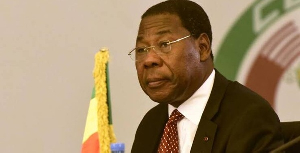– Top Ten Indications
There is no politically correct way of stating that President Mahama and his NDC have failed in delivering on the mandates that were handed to them in 2008 and in 2012. It is one assertion on which Ghanaians are unanimous. Since Mahama and his NDC cohorts took over a middle income Ghana in 2008, it is difficult to point to one area where there have been improvements; every aspect of our nation has regressed. Thus in keeping with NPP-USA's refusal to engage in bland and general characterizations, we embarked upon a critical evaluation of developments in the past eight years, and we hereby issue this ten-point analysis of why Mahama and the NDC have been an abject failure.
Ten – Accounting to the People Tour
This is the simplest of all the ten points. Citizens of a nation have eyes with which to see, ears with which to hear, and other sensory mechanisms with which to feel. A president and an administration that have done a good job of leading and governing a nation would ordinarily leave tell-tale signs everywhere as to their success. When a president has to embark upon a whole tour to show citizens what the citizens themselves should ordinarily see, hear, and feel as they go about their normal daily lives, something is amiss. Especially when one considers that the bulk of the content of the so-called Green Book - which the president is using to show what he claims to have accomplished - is nothing short of lies, fabrications, and artistic impressions, it becomes very clear that president Mahama is trying to manufacture success out of abysmal failure.
Nine – Dumsor's Persistence
Electricity is the backbone of every society. An abundance of it ensures that life goes on uninterrupted, factories and other businesses are kept in operation, surgical theaters continue to save human lives, and so on. That is what makes it one of the top priority areas for every administration. Yet for seven years now, erratic power supply has been the rule rather than the exception in Ghana under Mahama and the NDC. During this seven year period, there has been not less than twenty bold assurances by either the president or his officials from the energy sector that "dumsor", or erratic power supply will be, or has been put behind us. Seven years later, dumsor is still with us, and in front of us. Unforgivably, the problem remains unsolved despite the president creating a whole new ministry dedicated to solve the problem, and as much as $6 billion has been thrown at the problem. If this does not constitute failure, we all need to go back to school.
Eight – Unfulfilled Promises
The number of President Mahama's broken promises is outstripped only by the number of new ones he keeps making. Politicians are not new to breaking promises. But there is a sharp difference between promises made in good faith with every intention to fulfill them, and promises made with absolutely no intention of fulfilling them. In the case of president Mahama, it has become obvious that not only does he not have any plans of keeping the million laughable promises that he makes, but also he perfectly knows at the time of making those outlandish promises that he has no intellectual and resource capabilities to fulfill them. And yet he cannot resist the urge to continue making new promises even at a time when Ghanaians laugh at him each time he does so. For instance, after supervising the killing of millions of jobs for the past seven years, president Mahama promises to create millions of jobs if re-elected for another four years!
Seven – Breakdown of Rule of Law
No society can prosper without adherence to, and maintenance of the principles of the rule of law. In certain societies the government tries its best to maintain the rule of law while citizens render such efforts difficult. In the case of Ghana, however, it is the administration – with the active participation of the president himself - that is institutionally breaking down the rule of law. The Mahama administration has broken down the rule of law by a wanton disregard for rules such as seeking Parliamentary approval, as required by the constitution, to engage in activities such as making critical appointments, overspending sector budgets, and generally overstepping executive authority. And once the administration is itself complicit in a failure to obey the rules, it also relinquishes its moral authority to rein in those who do same. The result has been a Ghana where impunity has become prevalent from the president all the way down to the radio presenter. The law simply doesn't work, and Ghana cannot continue like this.
Six – Crowds Drawn
Some may say crowds at rallies do not translate to votes and they may very well have a point. After all the NPP and Nana Akufo-Addo have been drawing massive crowds for as far back as we can remember and yet the NDC continues to be in government. It is yet noteworthy that the president of an entire country, despite documented fact that it in fact buses paid crowds to his rallies and campaign stops – albeit dubbed as "Accounting to the people tour" – still fails to draw the crowds commensurate with his position. And yet the leader of the opposition literally brings, through no fault of his own, entire cities and localities to a halt whenever and wherever he visits. The people have shown in their numbers that they are drawn to hope and honest aspirations, and have seen through propaganda and deception that has characterized just about everything Mahama and the NDC do. Indeed you can fool some of the people some of the time, but you can't fool all the people all the time.
Five – Returning to Electoral Commission for Help
As Mahama and the NDC continue to see the writing on the wall, and having made a determined decision to maintain their hold onto power at all cost, the reality has set in that their only salvation lies in the manipulation of the referee charged with conducting and overseeing the election. After all it has worked before as was captured by a recorded quote on an NDC strategic meeting in 2012 that "the NPP may win the vote, but we shall win the count." In other words, regardless of how the people vote, it is what the chairman of the Electoral Commission declares that counts and determines who gets to govern. It comes as no surprise therefore, that Mahama circumvented the constitution to appoint a known NDC sympathizer, who allegedly uses Mahama's picture as her mobile phone screen saver, to the position of Electoral Commissioner. Mahama and the NDC are trying unabashedly to win the elections at the Electoral Commission headquarters rather than transparently facing the electorate. That shows an admission of failure.
Four – Robbing Peter to Pay Paul
As at the beginning of 2009 when the NDC government assumed office, Ghana's total debt divided among her population was GHC380 each. Today each Ghanaian including those born into the country as you read this article owes GHC4000. For a country blessed with gold, cocoa, timber and other natural resources, and on top of it all, oil and gas revenue of which no other administration has had the luxury of managing, it is inexplicable that in eight years this administration has, in addition to all that revenue, borrowed more money than all administrations from Kwame Nkrumah to John Agyekum Kufuor combined. And yet Ghana is still insolvent to the extent that the nation has to resort to borrowing high interest money to pay relatively low interest debt. This monumental failure has such damning ramifications that its effects will likely hamper Ghana's growth for a long time.
Three – Even Bribery Playbook is Not Working
The multi-faceted bribery campaign that Mahama and the NDC pursued in 2012 turned out to be an effective rigging mechanism. Anyone who had an outstretched arm was paid. This included vulnerable stakeholders at polling stations from all other political parties, Chiefs, EC officials at all levels, some members of civil society, security agency heads, and even voters were all beneficiaries of a largesse made available after the late P. V. Obeng said "if we have to empty the national coffers to win this election, that's exactly what we have to do." Fortunately, while all these people knew little about then new president John Dramani Mahama, and were willing to give him a chance, many of these same people have now realized that the stipend is not enough to last another four years. They have resolved to not only refuse them this time around, but also stories abound that in some constituencies, NDC functionaries who stopped by to share such largesse have now been run out of town. A couple of them had their vehicles burnt to ashes. The eyes of the electorate has been opened by the incompetence, insensitivity, and open thievery of Mahama and the NDC, and not even bribery can save them in 2016.
Two – Defections and Confessions
African economies including that of Ghana are so dependent on government resources and control that in many cases, speaking ill of a ruling government is almost a guaranteed way to take food off one's table. And in an environment where the government has dismantled the rule of law and rendered many institutions completely dependent upon the whims and caprices of the president, it is highly unusual to find that a few members of the ruling NDC who have any conscience left are now boldly confessing that the NDC has failed. Majority Leader Albin Bagbin, Tony Aidoo, former president Jerry John Rawlings, and a host of other NDC members, have all made public statements to the effect that Mahama's NDC has failed to live up to the expectations of the Ghanaian electorate. Some have even predicted doom at the polls for the ruling party. And for those who may say these are top members who already have the resources to continue to provide for their families, consider this: NDC members at the grassroots level are now defecting in droves to the opposition NPP. When members of a ruling party have concluded that their party has failed, who are we to conclude otherwise?
One – "IT'S THE ECONOMY, STUPID"
Please allow us to credit the 1992 Clinton campaign slogan. One of the most amazing observations we made at NPP-USA as we embarked upon this analysis is the fact that Ghana is in fact at its worst economically since independence. The average Ghanaian needs about 270% of his or her earnings just to afford the basic things on which to live. Surprisingly, this comes at a time when the nation, as at 2009, was positioned to build upon its middle income status. Aggressive taxation by this administration has unleashed the dual calamity of severely slowing down private sector growth and subjecting monetary resources to the unparalleled corruption associated with government control of cash. As a result, money that would otherwise create private sector jobs is now being embezzled with impunity by public officials.
As government revenues have grown due to tax increases and exports from gold, cocoa, timber, oil and gas, etc. to unseen levels (GHC100 billion over the past eight years), public borrowing has kept pace adding another GHC100 billion over the same period. Thus in eight years, Mahama and the NDC have had at their disposal over GHC200 billion to manage the affairs of the country. Yet nurses, teachers, government contractors, judicial service workers, doctors, and a long list of stakeholders continue to work with intermittent salary payments, and in some cases total non-payments. The administration always respond with the same phrase: "we have no money."
If an administration, which has had at its disposal the most resources of any administration since independence, cannot come up with the money to pay workers and government contractors, cannot come up with the money to repair power generation equipment when they come due for service, cannot keep electricity supply stable, cannot repair existing roads, and cannot invest in nation building, then it is very difficult to convince the electorate in an election year that that administration has succeeded, and deserves to be re-elected. Mahama and the NDC administration have failed Ghana, and must be replaced in this year's elections.
NPP-USA Public Relations Committee
Diaspora News of Thursday, 14 July 2016
Source: NPP-USA












